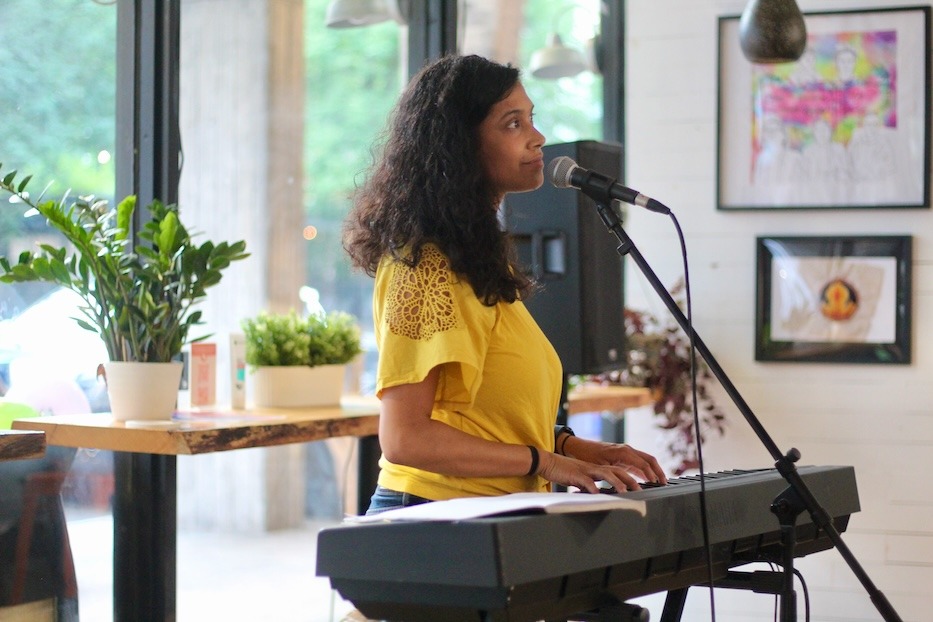
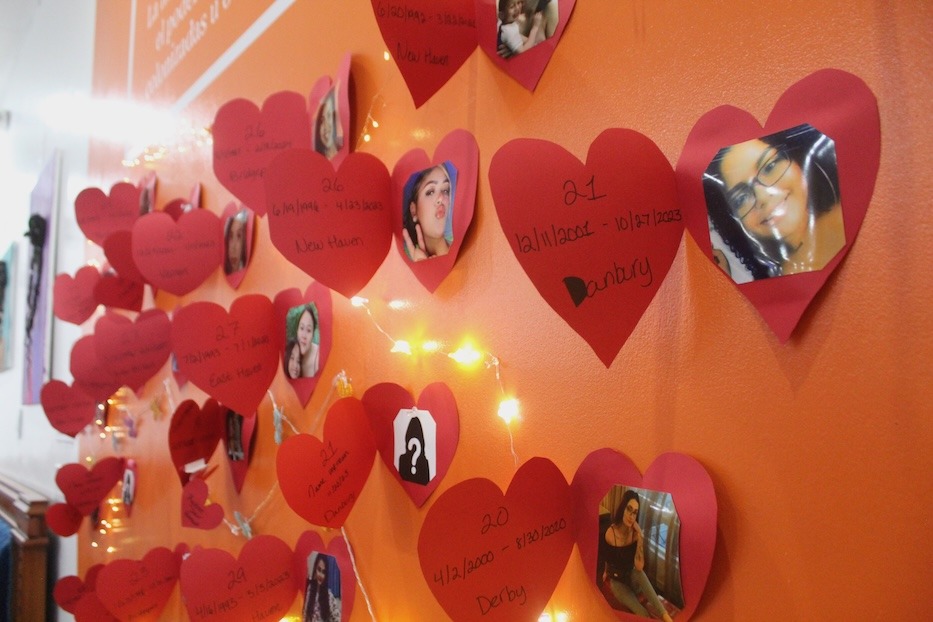
Top: Tina Colón Williams. Bottom: A detail from Vanesa Suarez’s installation No More Stolen Sisters. The piece was intended to be viewed while listening to Beyoncé’s “Heaven.” Lucy Gellman Photos.
The vocals wove through Havenly, cutting through the thick, humid air. Llena eres de gracia! On both sides of the stage, pieces of embroidery peeked out in brilliant color. Llena eres de gracia! An altar to the poet Juana Ines de la Cruz caught in the waning light, as if she was listening. Bendita tú eres entre todas las mujeres— Tina Colón Williams looked out across the audience. María, Madre de Dios.
Saturday, that sound became an entry into “Mi Derecho a Existir,” a multimedia arts festival, fundraiser, exhibition and celebration of women and femmes from Vivan Las Autónomas. Held at Havenly’s 25 Temple St. storefront, the event envisioned a world free of violence toward women and children, in which the vocabulary of femicide and intimate partner violence no longer exists, because there is no use for it.
Over five hours, it raised roughly $3,000 for the still-fledgling organization. More than 75 people attended, packing the space to standing-room-only capacity and spilling onto the sidewalk outside. Throughout the night, attendees and performers took time to remember 29-year-old Roya Mohammadi, whose 2023 death in the West River remains under investigation, and Lizzbeth Aléman-Popoca, a 27-year-old East Haven mother whose common-law husband was sentenced to 25 years in jail for her 2020 murder earlier this year.
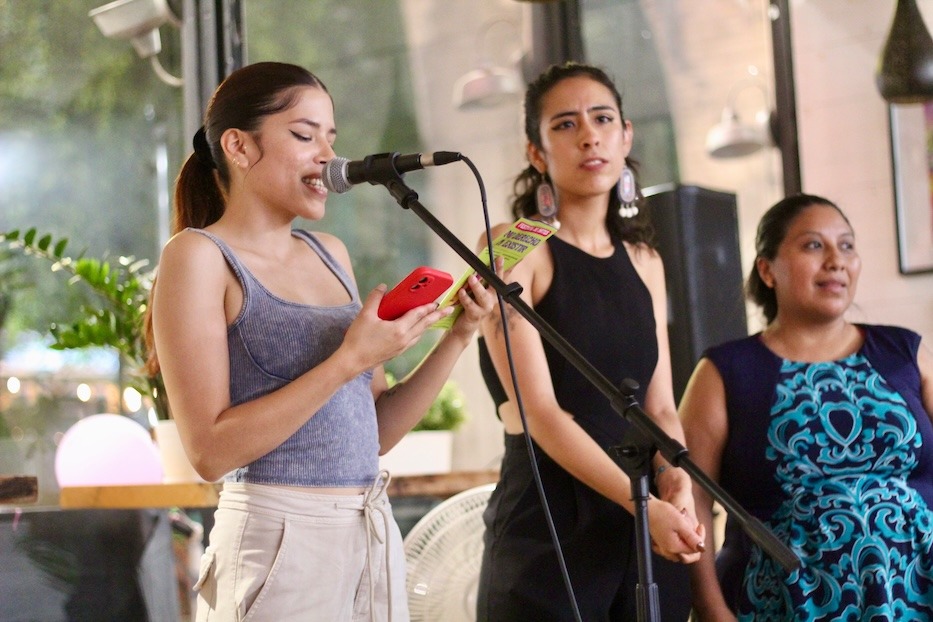
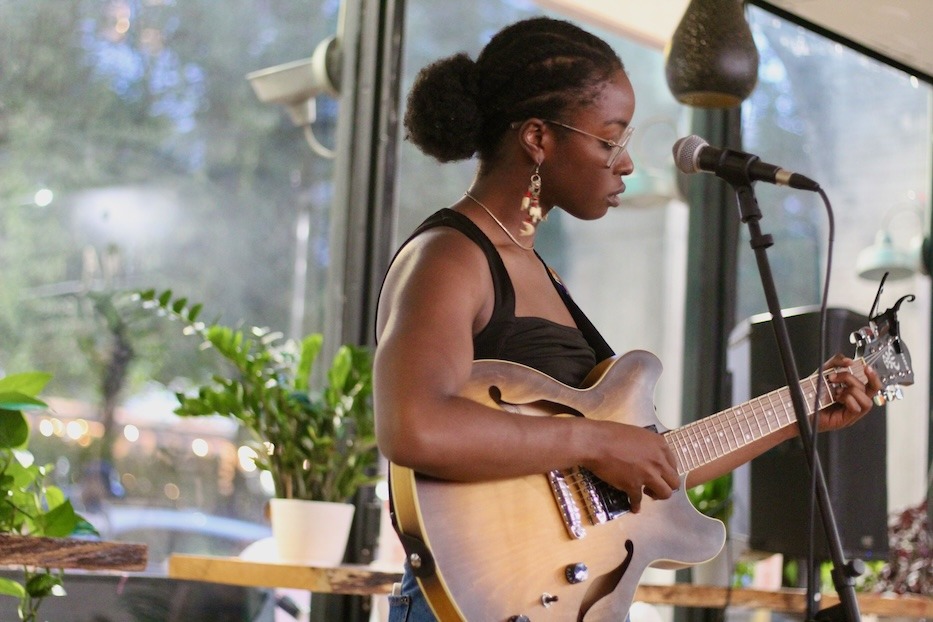
Top: Suarez (at the mic) with Camila Güiza-Chavez and Lida Catalina Llundo. Bottom: The musician Nehway Sahn.
“This is our first arts festival, and I think it’s really telling to where we are right now—as an organization, as a collective, as a movement,” said Vivan las Autónomas founder Vanesa Suarez. “These past four years, we’ve been really intentional in cultivating a space for grief, for loss, for that cultural work of creating consciousness around gendered violence and the pain that comes with that.”
“Today is what happens when we’re willing to have the courage to sit with a lot of loss and pain and grief and violence against women—like, what comes out of that?” she continued. “It’s these songs. It’s this art. It’s so much love and support for women that comes out of sitting with these stories. Today, we really gave ourselves permission to celebrate.”
That celebration appeared from the festival’s first moments to its last, as song, poetry, drag performance and impromptu speeches filled Havenly late into the evening. On nearly every wall, organizers had transformed the space into a gallery, with artwork that beckoned as soon as a viewer walked into the room. As attendees tucked into plates of rice, beans, and pupusas from La Cocina de Sandra, they walked around, sometimes shoulder to shoulder as they took in each work.
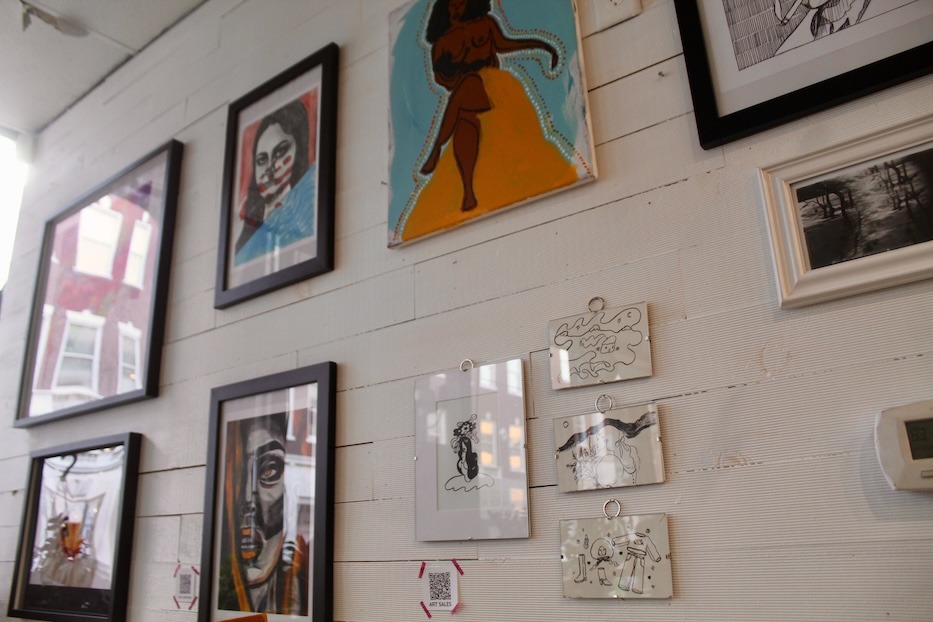
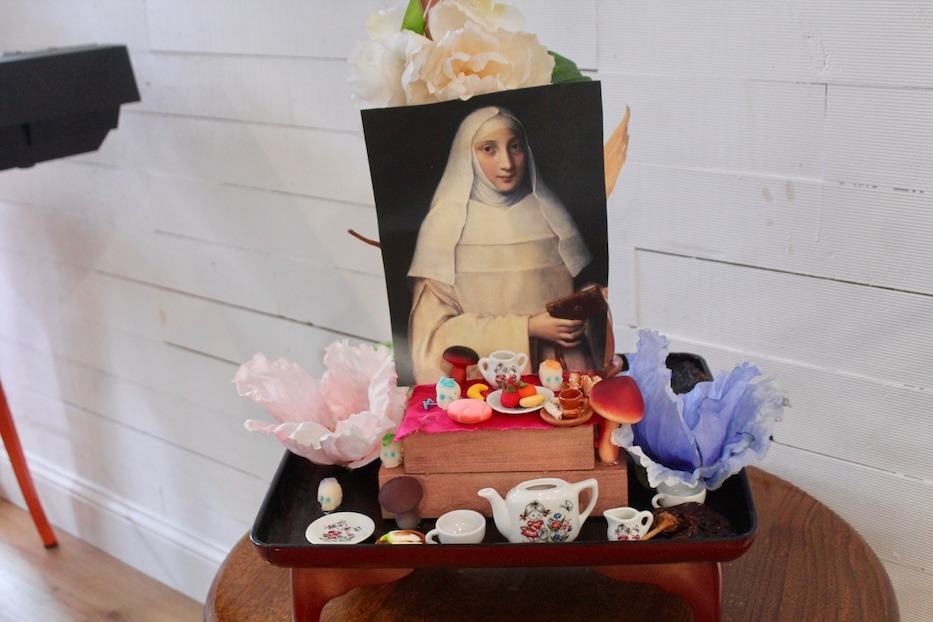
In one piece, 24-year-old Shamim Ara Mohammadi has depicted her sister Roya, hair flowing past her shoulders as a swimming, vertiginous sea of red fills the background. In the lower right hand corner, a block of blue rises in a perfect triangle, as if it is water coming up over her face. A red handprint, the universal symbol for missing and murdered Indigenous women, covers her lips and cheeks.
“Roya Mohammadi is a brave and strong girl who was sacrificed for being a woman,” she has written in an accompanying label. “Though her body drowned in water, her soul is alive and waiting for divine justice.”
Beneath it, Sarahi Zacatelco’s Homenaje a Sor Juana Inés de la Cruz drew a steady trickle of attendees, with a gentle-eyed portrait of the nun that seemed to follow people as they moved around the room. Beneath her soft face, three paper flowers sprouted from a tray, spreading their wide petals toward the ceiling. A doll-sized tea set sat among them, with sugar skulls, fluorescent pink conchas, and assorted fruit sculpted in miniature. On the back, a jarana and tiny woven textile peeked out, begging a viewer to look from all sides.
It was an ofrenda for a woman who was, in her time, a pariah—and a total trailblazer. Living in the 17th century as a nun, a poet and writer, Sor Juana Inés de la Cruz was seen as radical, Zacatelco explained in an accompanying label. In her 1691 “Respuesta a Sor Filotea de la Cruz,” written to a fellow nun four years before her death, she laid out an argument for why it’s okay—even necessary—for women to make art, pursue an education, and engage with the secular and creative world.
Over two centuries after her death, it earned her the sobriquet “The First Feminist in the New World” from the scholar Dorothy Schons.
“Feminine expression Is powerful, and I believe we need to have more representation of women by women in the arts,” Zacatelco wrote in a label accompanying the piece.
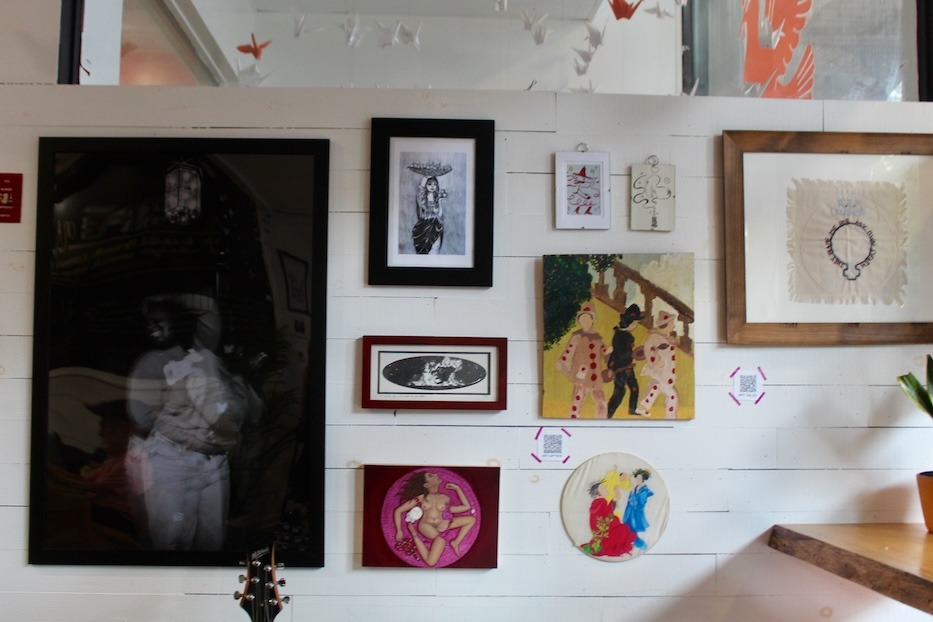
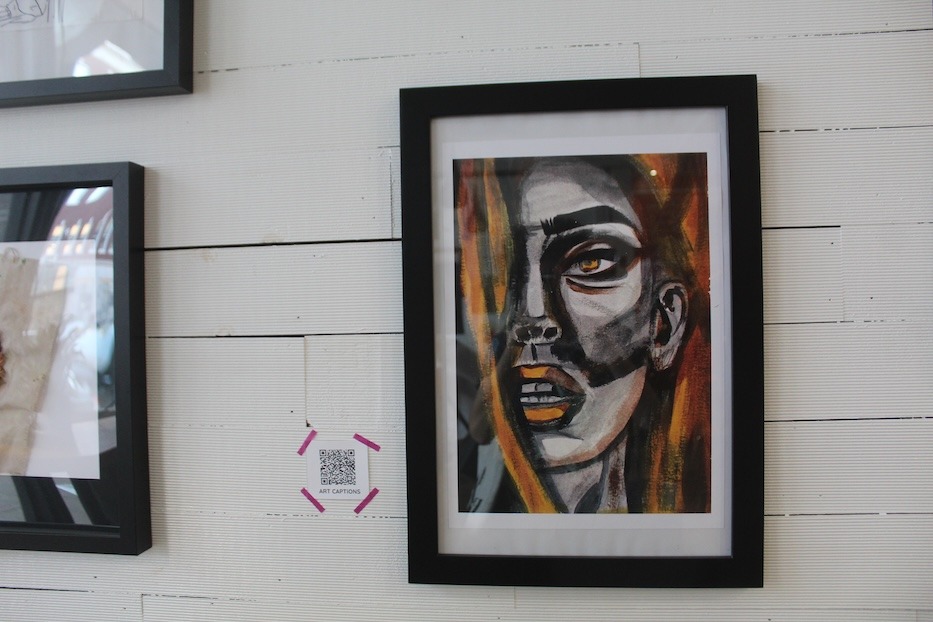 Top: From left to right: Work by Kevin Wing, Jisu Sheen, Kaelynne Hernandez, Lizzbeth Aléman-Popoca and Yaneth Aléman. Bottom: “A powerful woman with a golden soul,” by Shamim Mohammadi.
Top: From left to right: Work by Kevin Wing, Jisu Sheen, Kaelynne Hernandez, Lizzbeth Aléman-Popoca and Yaneth Aléman. Bottom: “A powerful woman with a golden soul,” by Shamim Mohammadi.
On the opposite wall, work by Aléman-Popoca herself hung in bright color, with a gentle, piled-on impasto that asked a viewer to come closer. In some ways, the work is a case study in what is left behind when someone is snatched from the world prematurely: the figures are faceless, their forms animated as they walk forward in profile. One has the tiniest hint of a smile, a curved sliver of black where their mouth might otherwise be. The piece exists without a title.
But it is also a reminder of the work that begins because of a sudden, rude and aching absence. In the nearby They Blamed Me for My Own Death, Lizzbeth’s younger sister, Yaneth Aléman, has embroidered the universal glyph for women, literally picking up a thread where Lizzbeth was not permitted to finish. Around a circle, she has stitched the titular words, with the proclamation R.I.P. Lizzbeth above it. Saturday, it was hard to look at the two artists together, both young immigrant women, and make sense of a world where one no longer exists in body.
As they checked in on performers and organizers, emcee Jeniffer Perez Caraballo said they were excited to kick off the night. The director of community organizing at She Leads Justice (formerly the Connecticut Women’s Education and Legal Fund), Perez Caraballo joined Vivan Las Autónomas last year, after a rally for Mohammadi at West Haven City Hall. 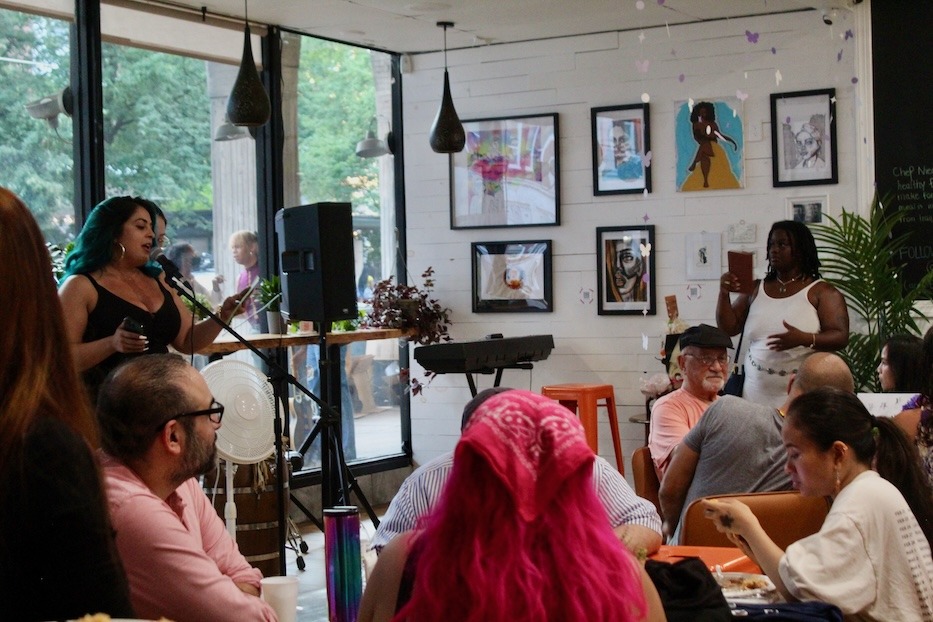
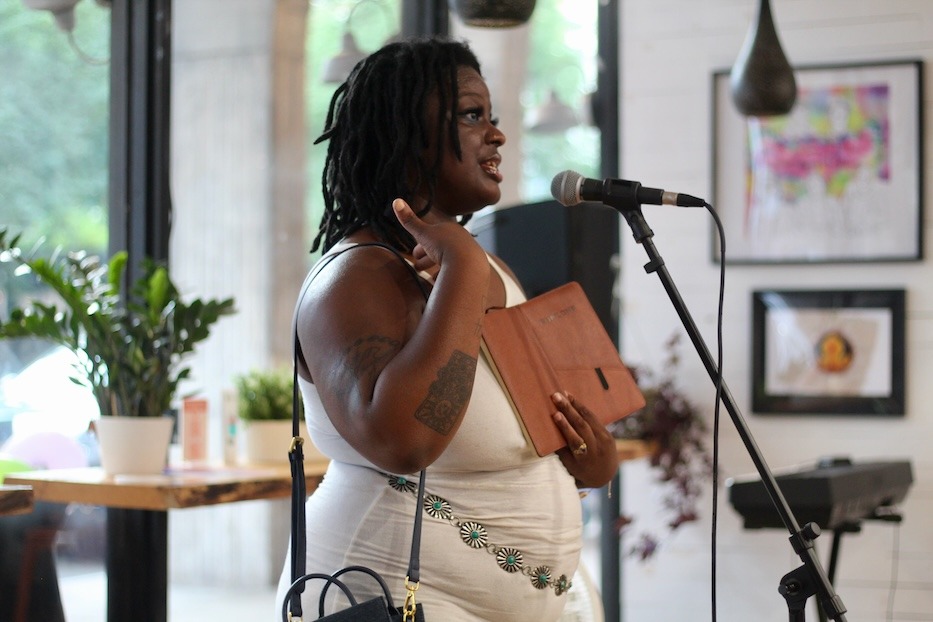
Top: Jeniffer Perez Caraballo. Bottom: Carefree Dandelion.
As a woman, a person of color and a longtime feminist and organizer, Perez Caraballo said Vivan’s mission and vision also speaks to them. Currently, there are few places in the world—let alone this country, or this state, or this city—where it seems safe to be a woman or a girl. Instead, “we’re in a world where women and girls grow up understanding that their bodies are subject to violence,” they said.
Behind them, a wall with 38 paper hearts, each representing a Connecticut woman lost to intimate partner violence, seemed to glow red. Titled No More Stolen Sisters, Suarez installed the piece before the show to display in real time the scale of loss. Together, the 38 women represent 21 cities across Connecticut. Their deaths took place in under a decade, from 2017 to 2024.
“I think most people would love to just chill and be comfortable,” Perez Caraballo added as people kept arriving, some lingering at No More Stolen Sisters, the faces of victims soft under twinkling white lights. “But it’s not comfortable. We can’t be comfortable. We’re dying.”
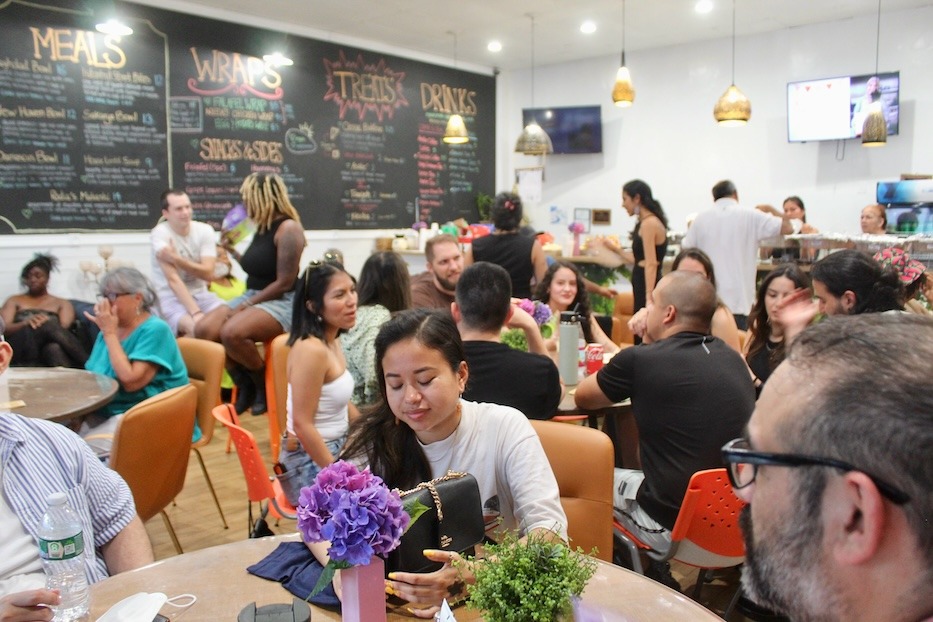
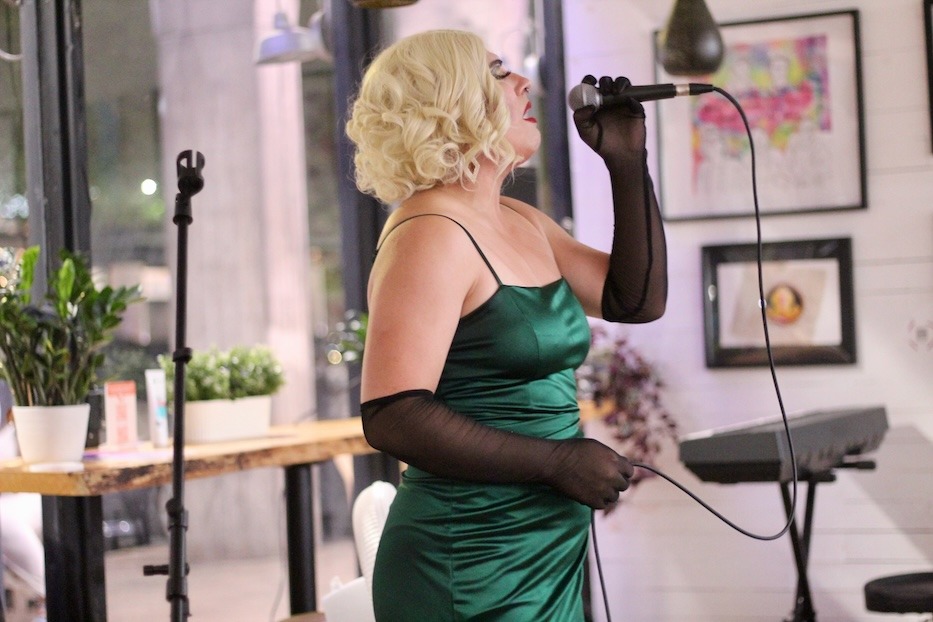 Like the visual artists (their works will remain on display for the foreseeable future; view all of them here), Saturday’s lineup of performers came ready to heal, grieve, process, and organize, sometimes in the span of a single set. Reading early in the evening, Carefree Dandelion (a.k.a. poet Danielle Walker) remembered walking to her car one evening, still floating on what had been a near-perfect night.
Like the visual artists (their works will remain on display for the foreseeable future; view all of them here), Saturday’s lineup of performers came ready to heal, grieve, process, and organize, sometimes in the span of a single set. Reading early in the evening, Carefree Dandelion (a.k.a. poet Danielle Walker) remembered walking to her car one evening, still floating on what had been a near-perfect night.
That was, until two men interrupted her reverie with the words, “Smile, Queen.”
On stage, she took a deep breath in, letting her hands travel through the air as she read. Line by line, she flowed into a rebuttal, wondering aloud if a man would have ever received the same directive to smile. “Nothing on my body is for you/So I advise you—”
She paused for less than half a minute, maybe under ten seconds. “Actually, I am warning you—”
“Yessssss!” shouted someone in the center of the audience. It broke a kind of stiff, starched quiet that had been hanging over the crowd: suddenly murmurs of agreement seemed to come from every direction. They lasted as Walker wove through a set that included trauma and assault, resonant when she announced “Call me survivor! Call me warrior! Call me phoenix!”
“You really had me when you said ‘Nothing on this body is for you,’” Perez Caraballo said before looking out into the audience and leading a call-and-response of “Victims, we believe you! Survivors, we believe you!” and “It did happen!”
That expansive, often vibrant reclamation of narrative remained on the stage as Elm City Vineyard’s Tina Colón Williams set up a keyboard, bridging centuries with a humble, brown paper notebook of handwritten songs placed at the corner of the piano. As she launched into a letter to the Virgin Mary—a woman who was mocked, disbelieved, and cast out before she was ever celebrated—her voice filled the room, rising to the ceiling, unfurling to the back counters, the kitchen, the walls with chalkboard menus and huge Arabic lettering in black paint.
It permeated a set from poet Michelle Phương Hồ, who revisited the story of La Malinche, an Indigenous Nahua woman who is often seen as a traitor for working as a translator for the Spanish colonizer Hernán Cortés. As she introduced her poem “Facing It,” Phương Hồ both explained that she could see herself in La Malinche’s history and asked aloud how much of that history has been misunderstood or left unsaid.
The poem was inspired by both Alfredo Ramos Martínez’ 1940 portrait of La Malinche and the work of living poet Yusef Komunyakaa, who has a poem of the same name. As she began to read—I can almost say my name/I’m almost someone I know—the room fell to silence, then soon filled with the occasional chorus of snapping or deep, throaty Mmmmm sounds.
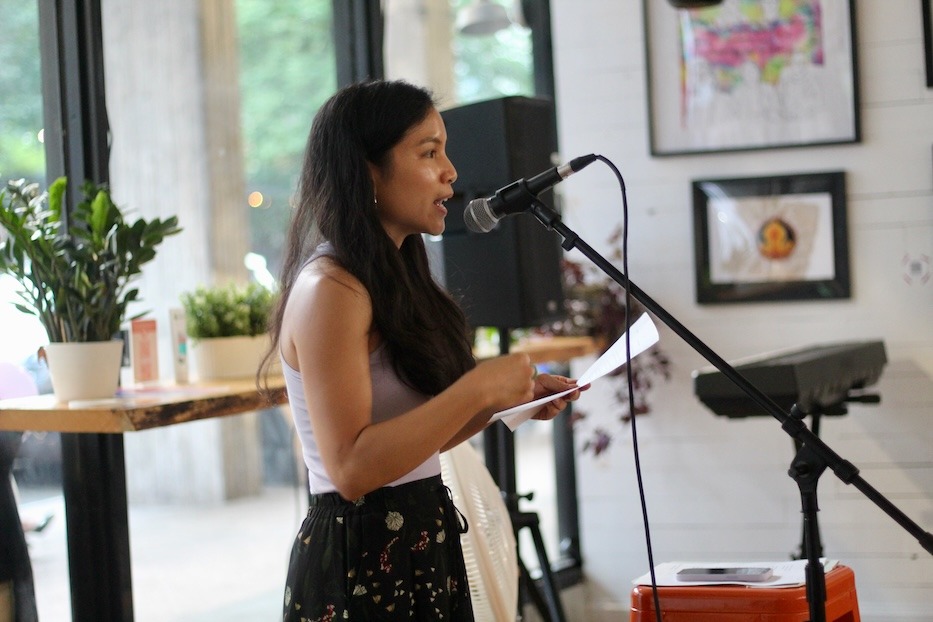
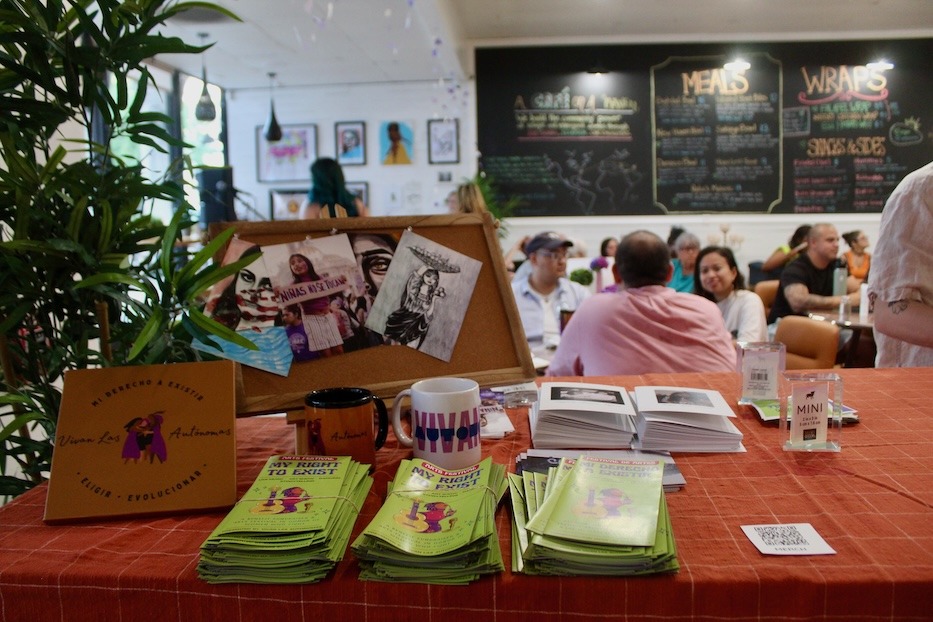
Top: Poet Michelle Phương Hồ. Bottom: Merch, which is still relatively new to the organization and goes directly to Vivan’s mission.
“I feel like we’re in a room of sisters, of siblings, who’ve been able to care for each other, and that’s part of why we’re here,” she said before continuing with the works “Chorus of the Scorned” and “Talking It Out.”
As her voice filled the space once more—”Have you tried praying? Have you tried/with a fist between your teeth. Have you answered the door/refusing to be the answer”—it became a voice that many in the room had likely heard some version of, a line of questioning that suddenly seemed so familiar. When Perez Caraballo took back the mic, it garnered another chorus of “I believe you!” and “We believe you,” said to no one in particular and everyone in the room.
As she took it in, elbows resting on a merch table, multimedia artist Ariella Sanchez praised the evening as a chance to support fellow artists. Working in a studio space on Chapel Street, she’s gotten to know the singer Rosalie, who is also an organizer and member of City-Wide Youth Coalition (CWYC). So when she learned that Rosalie would be performing, she looped in milliner and maker Catherine Cazes-Wiley and headed to Havenly.
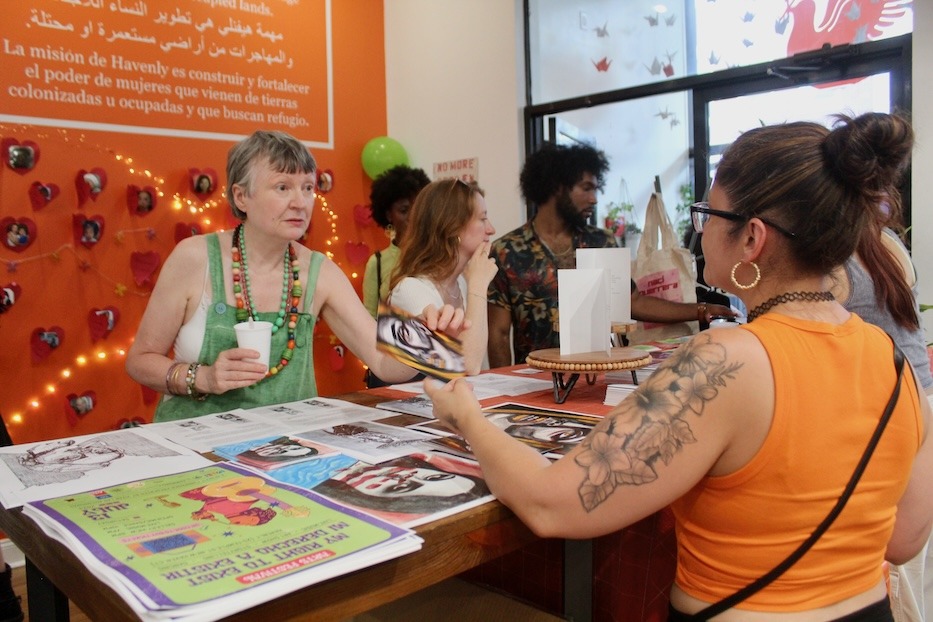
Catherine Cazes-Wiley and Ariella Sanchez.
Supporting Vivan also felt personal, she added: it was leaving an abusive relationship two years ago that enabled her to more fully pursue her art. “That was the opportunity for me to really follow my dreams,” she said.
Back on stage, Yaneth Aléman had appeared alongside her niece, Aléman-Popoca’s daughter Astrid, and Vivan co-founders Suarez and Nika Zarazvand. In the years following her sister’s murder, Suarez said, Aléman has never stopped fighting for justice. This spring, she saw some version of it when Lizzbeth’s killer, a common-law husband with whom she had tried to end a relationship, received 25 years for her murder. As she spoke, Astrid clung to her aunt, crumpling into her chest in tears.
“This is a family,” Aléman said of Vivan las Autónomas. “It’s been a lot, it’s been pretty tough. But this is an honor for Lizzbeth, and for Roya as well. Hopefully we continue pushing forward to make a better future. Not only for women, for children and for every victim that’s out there that needs the help. There’s a lot that we can do to support our community, and support our sisters, our friends, our loved ones. They’re the ones that matter. They’re the ones that deserve…”
She trailed off for a moment, something wavering in her voice. “They’re the reason why we’re here. Take a moment, remember your loved ones, and if you can, give them a hug. Send them your love, even if you’re far away. You never know if it’s going to be the last moment, the last time.”
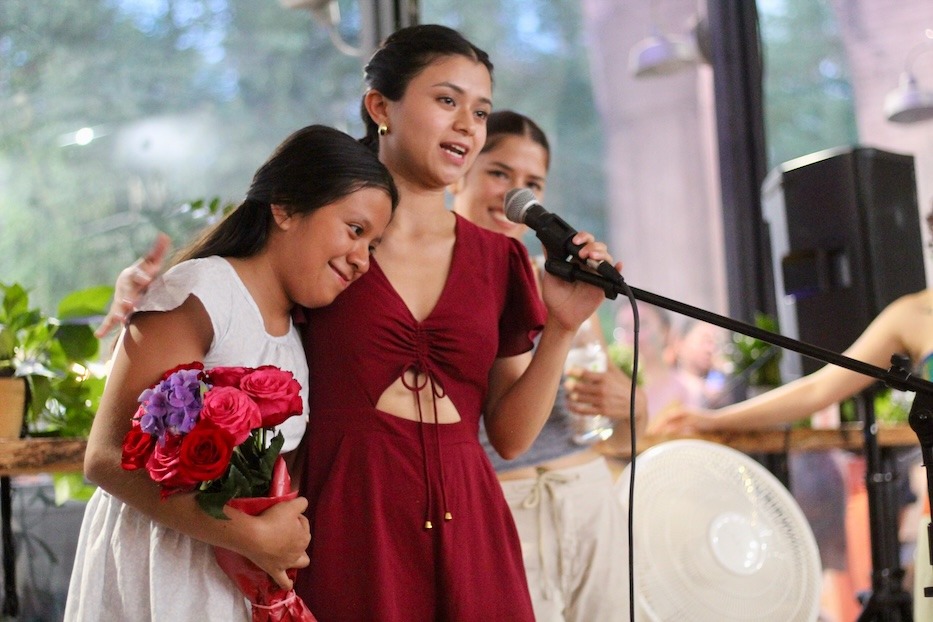
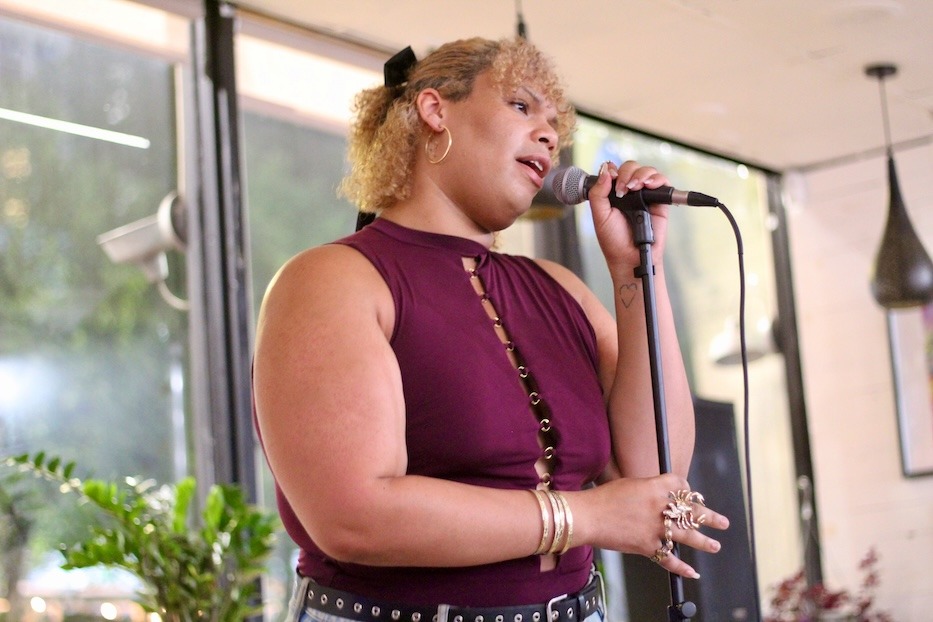
Top: Astrid and Yaneth. Bottom: The musician Rosalie, who picked up the pace with her pop-inflected and sultry bops.
Those words remained in the air as Perez Caraballo introduced the musician Nehway Sahn, who is based in Waterbury but performs frequently in New Haven and across the state. They resonated as the drag artist, Mz. Ray, dipped into a journal entry musing on the title of the festival. They pulsed with the throbbing, earwormy beat Rosalie brought to the stage.
But nowhere, perhaps, were they clearer than in the music of Camila Güiza-Chavez, an active member of Vivan who announced her departure from Havenly earlier this year. For the past year, Güiza-Chavez has been working on “Canciones Para Nosotras,” a compendium of songs that honor and pay homage to the women she works and organizes with, and the women she has loved and lost before their time.
Saturday, she handed out packets in the original Spanish and in translation, so that attendees could follow along. The women she’s written about include Lida Catalina Llundo, who is fighting for the physical safety and wellbeing of her young daughter; Tortilleria Semilla co-founder Anabel Hernàndez; Mohammadi and victims of femicide and violence everywhere.
“I love being part of an effort that values and recognizes the power of culture to shift policy,” she said in an interview before the performance. “So I love the emphasis on art mixed with advocacy, because I really believe that we’re gonna bring the revolution that we need by creating art that reflects our real experiences and the experiences of our community.”
“The legal system perpetuates violence and it’s up to us to make a different way, to make a different world,” she added later in the evening.
As she opened with “Lida,” written to honor Catalina Llundo as she fights for her young daughter, Catalina Llundo looked on, tears welling in her eyes. Just moments before, she had called on members of the audience to advocate for women and children not just in Connecticut, but across the globe. Now, she listened as Güiza-Chavez’s voice swelled through the room, transforming everything it touched.
“I know that there are many mothers in my situation,“ Catalina Llundo had said as Güiza-Chavez translated just minutes before. The words suddenly felt kinetic, alive. “Let’s organize a march for my children, for all children.”
For more from Saturday, watch the videos above.
This post was originally published on this site be sure to check out more of their content







